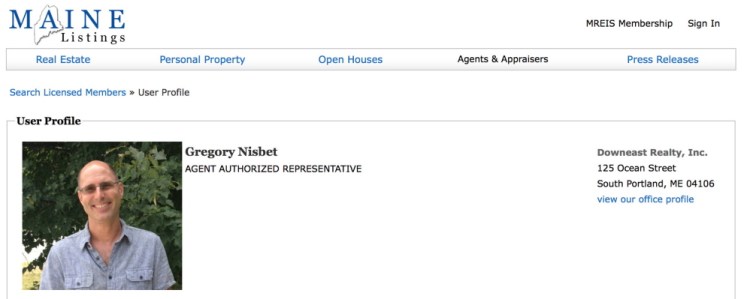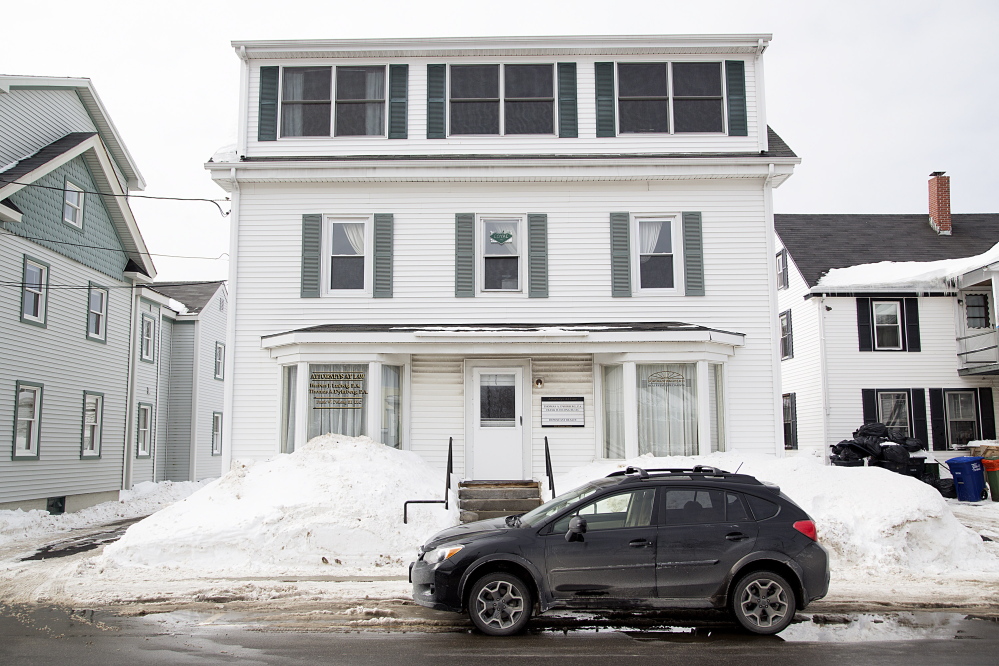Before he became known as the owner of the building where six young people perished in a fire, Gregory Nisbet was known among the Portland real estate community as a personable, honest broker.
Nisbet was an accommodating landlord and a motivated real-estate salesman, laid back yet professional, a go-getter without being aggressive, his colleagues said.
“He was about getting the big picture to work out, and wasn’t out to squeeze people for every penny,” said Brit Vitalius, a Portland-based real estate broker who has known Nisbet professionally since 2004, and has completed a couple of property deals with him.
“I don’t think he was the way he’s being portrayed, as malicious or a slumlord. He trusted the people there, and they trusted him,” Vitalius said.
Since the Nov. 1 blaze that killed six people at his two-family building at 20-24 Noyes St., Nisbet has not responded to media inquiries, remaining silent as the attention of a community and the focus of a city’s inspections department bore down on him.
He is facing at least four wrongful death lawsuits by the relatives who hold him responsible for the deaths of their loved ones because of the lack of working smoke alarms and emergency exits, among other things. A judge has ordered his assets frozen because of the possibility of multimillion-dollar settlements or judgments. And Nisbet also is under criminal investigation by the Cumberland County District Attorney’s office for possible manslaughter charges.
Through his attorney, Matthew Nichols, Nisbet declined to comment for this article. But Nichols indicated that his client has not been able to publicly convey his feelings since the deaths, and was advised against expressing remorse to the families of the deceased.
“He’s very emotional about it and very distressed about what happened,” Nichols said. “Just the fact that (the fire) happened in his building, it’s weighing more heavily on him than any criminal charges would be.”
Interviews with professional colleagues, tenants at his properties and a neighborhood leader portray Nisbet as a charismatic and accommodating businessman whose stewardship of his properties was, at the very least, permissive.
SUCCESSFUL BROKER, HELPFUL BOSS
Nisbet has been a licensed real estate professional in Maine since 1988, according to state records, but his family’s involvement in real estate goes back much further, state records show. Downeast Realty was founded by Herbert and Jeanne Nisbet in 1956 and based in South Portland, where the business remains. It was not clear Wednesday how the founders are related to Gregory Nisbet.
Professionally, Nisbet specialized in the sale of multifamily homes, according to colleagues. He lives in Portland on Noyes Street, near the apartment building that burned and two other rental properties nearby.
“He certainly was a successful broker,” Vitalius said. “You can’t be a total flake and own a business in a small community for that long.”
One former employee, Veronica Schneider, described Nisbet as a nurturing boss and a compassionate person whose true character has been buried under an onslaught of negative publicity and speculation since the fatal fire.
Schneider met Nisbet in 2004, when he hired her as an independent contractor. She said Nisbet was more than just a mindful employer, he was a mentor.
“He was always overlooking my duties so if I made a mistake he caught it before anybody,” Schneider said. “Everything was passed by his desk. He looked at everything I did to make sure it was done correctly.”
Although she did not interact with his tenants, Schneider did learn about Nisbet’s property management style, and described him as “generous” with the people who occupied his buildings.
In 2004, Schneider said, she remembers when Nisbet renovated the home at 20 Noyes St., and used the experience as a teaching moment. “I remember he always told me it’s important to take care of your properties because that’s how you retain value,” she said.
Now that Schneider owns 88 units in Portland and manages another 400, she can see how her business practices diverge from Nisbet’s.
When rent was late or someone couldn’t pay, Nisbet would work with people, she said, rather than going immediately to eviction proceedings at the soonest legal opportunity – a doctrine her company, Schneider Property Management LLC, follows because of the large number of units under its care.
In another sign of his flexibility, Nisbet often didn’t require leases of his tenants, a type of arrangement that is legal and preferred by some landlords.
“I know a lot of landlords, and we always have the debate: Should we do a lease? Should we not do a lease?” Schneider said.
Renting an apartment without a written document spelling out terms, known as tenancy at-will, comes with its own set of rights and limitations for both renters and landlords. Each method of tenancy has its potential benefits and risks.
For tenants who may need to move on short notice, for example, tenancy at-will means not having to lock into a 12-month commitment. For landlords, verbal agreements can offer flexible, short-notice authority to tell a tenant to vacate, but lack the accountability and enforceable authority of terms that are recorded in black and white.
The preference for less formal agreements fit Nisbet’s personality, according to Vitalius.
“I’m sure that he’s looking back and would have done some things differently,” he said.
HEAVY SCRUTINY AFTER DEADLY FIRE
After the fire at Noyes Street, public attention rapidly shifted to the other rental properties in the University of Southern Maine neighborhood that Nisbet owns, all within a short distance of his own residence.
One of these properties, a large, two-family home at 186-188 Dartmouth St., has been the source of new scrutiny for the already embattled landlord.
Earlier this month, Portland inspectors declared the unit at 188 Dartmouth unfit for habitation, and obtained a temporary court order to keep people from living there.
City officials also have said the building may have been run as an unlicensed rooming house, which would mean tenants rented individual rooms within the apartment. Rooming houses must meet a higher standard of fire safety because they tend to have more occupancy and tenants who are unrelated to each other.
According to Vitalius, the Dartmouth Street property, with six bedrooms in each of its two units, is typical of the neighborhood, where homes were built during a time when families had more children. Now those large two-family homes are often occupied by students looking for cheap housing near campus.
Vitalius said he and Nisbet only discussed Nisbet’s rental properties casually, and was told they provided consistent income.
“He just had the challenges of having a lot of tenants, and he ran it to be that way,” Vitalius said.
One tenant, Ben Martha, said Nisbet was personable, but was unusually lax on the timing of rent payments and sometimes arrived unannounced to collect money.
Martha, who lived for a year at 188 Dartmouth St., said Nisbet was nice enough, but he and others came to dislike Nisbet’s habit of coming to the apartment unannounced looking for rent money.
“He’d come by whenever he wanted, (saying) ‘Yo, who’s got money for me,’ kind of a thing,” Martha said. “It wasn’t a very professional setup.”
The laid-back attitude irked Carol Schiller, a neighbor and president of the University Neighborhood Association, who said she had lodged complaints with Nisbet personally, and then later with the city, ever since he bought the Noyes Street house in 2003.
Immediately after Nisbet took over, Schiller said young tenants often partied late into the night, were careless about where they threw their trash, and in general did not appear to take good care of the home.
When Schiller took her complaints to Nisbet, she said her pleas fell on deaf ears.
“Greg just basically gave them the keys and was like an absent parent,” Schiller said. “It never appeared that he had any standards or rules for how tenants should take care of his property. I think people took advantage of him, took advantage of it and ran the house like a crazy fraternity house.”
TENANTS EMPATHIZE WITH LANDLORD
Tenants of properties owned by Nisbet, both past and present, are split about his management style.
Patrick O’Reilly, 25, who moved into 186 Dartmouth St. about two years ago while he was a student at USM, said the public perception of Nisbet has been unfair.
“My initial impression of Greg was that he was outwardly friendly, energetic, and ready and willing to get people housing right away,” O’Reilly said. “He wanted me to make a (verbal) commitment to him.”
Instead of going on a handshake, O’Reilly said he drew up a basic lease that they both signed, outlining the length of the rental, monthly rent payment and utilities for which tenants would take responsibility.
Since then, O’Reilly said his interactions with Nisbet have been consistently positive. O’Reilly believes Nisbet is being scapegoated by the city and the public.
“I think he’s getting railroaded, and I understand why. It’s a high-emotion issue. Young people died,” O’Reilly said. “Part of the stages of grief is trying to assign the blame to someone. People don’t want to see this as an act of chance, because that decreases their sense of security.”
Scarlett McEachern, who lives across the street at 183 Dartmouth St., another two-family house owned by Nisbet, said she used to clean his apartments part-time when they turned over. She would see the aftermath of irresponsible tenants who often left a mess.
“He goes through a lot of (expletive) with kids messing up his buildings,” McEachern said in November, one day after the Noyes Street fire. “He’s not a bad landlord. I hope people don’t take it out on him.”
Both Schneider and Vitalius said Nisbet’s situation of having many tenants that turned over frequently, some without leases, can make it complicated to unwind where tenant-landlord responsibilities start and stop.
This dynamic can be especially frustrating when landlords do not know or are not notified when tenants alter an apartment in violation of code, or use a space in a way that is unsafe in the eyes of the law.
For example, while civil lawsuits seek to hold Nisbet accountable for the lack of working smoke detectors and a blocked exit, a Portland fire official suggested it was the tenants who disabled the alarms and left debris in front of the exit.
“I think the Noyes street fire has made a lot of landlords realize that tenants are taking their smoke detectors, they are blocking egresses, so we have to work with them,” said Schneider, Nisbet’s former employee.
Vitalius said he has been struck by the sense that as a landlord, he could have easily been in Nisbet’s position.
“Greg’s not a malicious person. I don’t want to say ‘terrible luck’ because there’s things that were in people’s control,” he said. “But it scared the heck out of the landlords.”
Send questions/comments to the editors.





Success. Please wait for the page to reload. If the page does not reload within 5 seconds, please refresh the page.
Enter your email and password to access comments.
Hi, to comment on stories you must . This profile is in addition to your subscription and website login.
Already have a commenting profile? .
Invalid username/password.
Please check your email to confirm and complete your registration.
Only subscribers are eligible to post comments. Please subscribe or login first for digital access. Here’s why.
Use the form below to reset your password. When you've submitted your account email, we will send an email with a reset code.